TADOC
| Reports - Turkish Report on Drugs and Organized Crime 2008 |
Drug Abuse
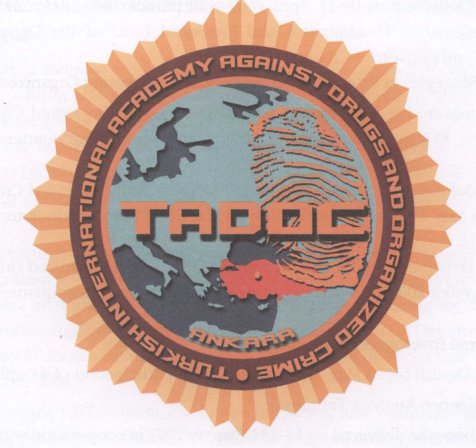
TURKISH INTERNATIONAL ACADEMY AGAINST DRUGS AND ORGANIZED CRIME
1. NATIONAL TRAINING
Basic Trainings for Department of Anti-Smugg,ling and Organized Crime
• Basic Training 55'h Period: Computer Based Training Modules were completed during 30 April - 13 May 2007 and a graduation exam was applied on 23 June 2007 with attendance of 226 officers.
• Basic Training 56th Period: Delivered on 14-25 May 2007 with participation of 35 supervisors.
• Basic Training 57th Period: Delivered in Antalya on 03-14 December 2007 with participation of 104 supervisors and officers.
• Basic Training for Managers at the Department of Anti-Smuggling and Organized Crime: Delivered on 24-28 September 2007 with participation of 24 superintendents and high rank officers.
Department of Anti-Smuggling and Organized Crime Leader Manager Workshops
Leadership Management Skills Workshops were organized in 3 periods.
• Period I: Delivered on 19-21 February 2007 with participation of 36 mid and high rank officers from Headquarters and Provincial Units of the Department of Anti-Smuggling and Organized Crime.
• Period II: Delivered on 26-28 March 2007 with participation of 29 mid and high rank officers from Headquarters and Provincial Units of the Department of Anti-Smuggling and Organized Crime.
• Period III: Delivered on 09-11 April 2007 with participation of 35 mid and high rank officers assigned to Headquarters and Provincial Units of the Department of Anti-Smuggling and Organized Crime.
Methods and Strategies of Project-Based Working for Combating Organized Crime Training
• Period I: Delivered in cooperation with TADOC — Anti-Organized Crime Division on 19-23 March 2007 with participation of 29 officers from Headquarters and provincial units.
• Period II: Delivered in cooperation with TADOC — Anti-Organized Crime Division on 30 April — 4 May 2007 with participation of 37 officers from Headquarters and provincial units.
• Period III: Delivered in cooperation with TADOC — Anti-Organized Crime Division on 10-14 September 2007 with participation of 21 officers from Headquarters and provincial units.
Organized Crime Investigations Training
Took place in Denizli on 28 May- 01 June 2007 with participation of 44 officers. Criminal Intelligence Analysis Training
• One workshop was delivered on 12-23 February 2007 in cooperation with British experts and with participation of 10 officers, 6 from Headquarters and Provincial Units of the Department of Anti-Smuggling and Organized Crime and 4 from the Coast Guard Command.
• Another one was delivered in cooperation with German experts on 12-19 November 2007 and with participation of 19 officers from various units of the Department of Anti-Smuggling and Organized Crime.
Surveillance Techniques Training
• Delivered on 29 January - 09 February 2007 with participation of 14 officers, 2 from our Department, 10 from Ankara and 2 from Diyarbakir.
• Delivered on 12-23 March 2007 with participation of 19 officers, 1 from Istanbul, 9 from Bursa and 9 from Sakarya.
• Delivered in Diyarbakir on 17-26 October 2007 with participation of 12 officers.
• Delivered in Diyarbakir on 05-16 November 2007 with participation of 12 officers.
In cooperation with Germany:
Basic Surveillance Workshop was organized on 20-30 November 2007 with participation of 21 officers from provincial units.
Under coordination of the Financial Crimes Division;
Financial Crimes Training was delivered to 20 officers from our provincial units on 26-30 November 2007.
Under coordination of the Technical Division;
Basic Technical Surveillance Training was delivered to 21 officers from our provincial units on 20-30 November 2007.
2. COMPUTER BASED TRAINING (CBT)
General Overview
Computer based training modules are created through a series of multimedia software applications by adding sound, graphics, animation and video clips to written texts. CBT program is an example of (asynchronous) distance learning that does not necessitate the instructor and the learners to be present at the same physical environment. Interactive learning contents (modules) prepared by United Nations with contribution of subject experts are presented to participants in a shorter time, more systematically and more effectively thanks to CBT.
Some basic practical knowledge and skills are made available to law-enforcement officers working in anti-smuggling operations by CBT modules quite effectively and in relatively shorter time than in traditional trainings. The CBT program, being an important tool in achieving the anti-smuggling and organized crime policies of our Department has been in service for use by all local and international law enforcement agencies that TADOC responds to since September 2004.
In the last 4 years, CBT content has been completed, and significant progress has been achieved in equipping rooms of some cites with the program and in operating the program. As a result of all the work so far, the number of officers trained on the CBT exceeded 6500 as of December 2007.
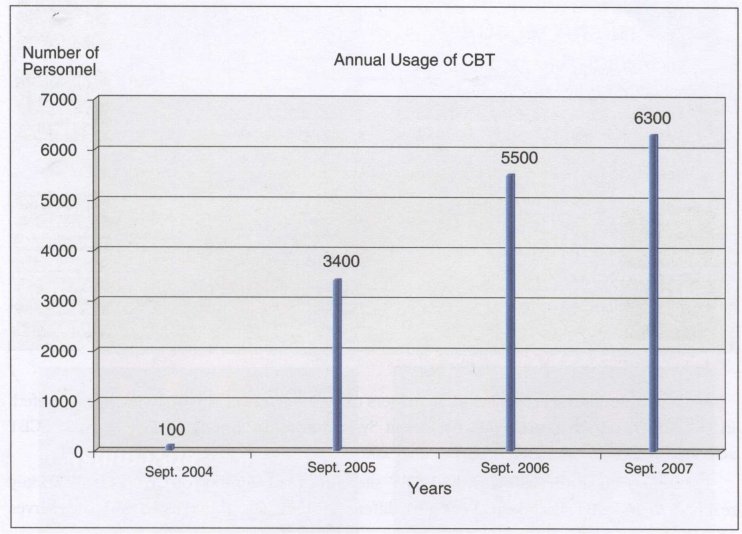
CBT Activities in 2007
In 2007, activities of the CBT Section mostly focused on acquiring new content. In this respect, as a result of discussions with the United Nations Office on Drugs and Crime (UNODC) it was decided to add 18 new modules to the existing system. This is an achievement of one of the objectives laid down for CBT Section in the TADOC Strategy Paper covering 2007-2010.
The new modules are defined under three categories: 'Money Laundering', 'Intelligence' and Interdiction Techniques for Land Controls'. A total of 18 new modules under the above mentioned headings were added to CBT in December 2007.
CBT modules were installed by officers of the CBT Section first at the Dog Training Center, then at G•51ba§i Campus of the Police Academy and finally at Antalya Training Center of the Coast Guard Command before the first half of the year.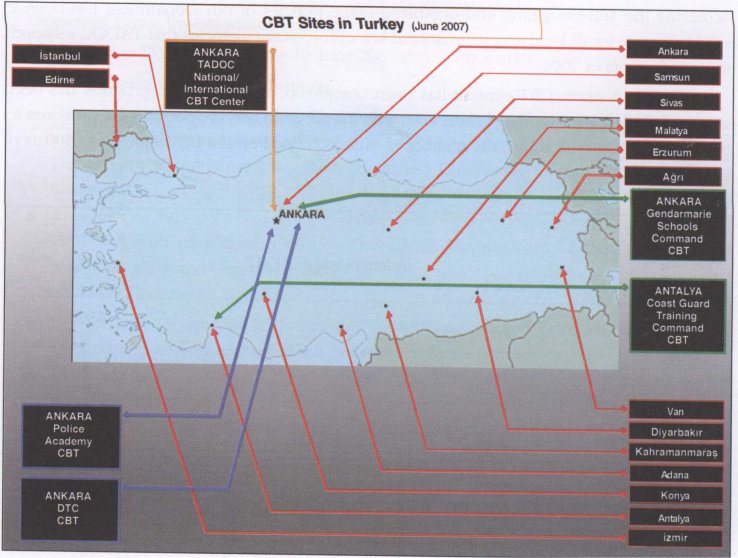
Once the modules were installed, managers to be in charge of the CBT sites were briefed, in December, on the Learning Management System and functioning of CBT activities. CBT activities in these units started in September 2007.
Together with the newly launched CBT sites, the total number of CBT sites in Turkey reached 20 and CBT modules covering 61 different topics. The above listed CBT sites serves on a 7/24 basis.
Knowledge and experience level of TADOC on computer based training is now appreciated in the international platform. Upon an offer from UNODC's Regional Office for Central Asia (ROCA) in August 2007 a total of 35 law enforcement officers from Tajikistan and Kyrgyzstan received the `CBT Site Managers Training'. Theoretical and practical inputs bn the Learning Management System and operational information on CBT functioning were delivered to law enforcement officers who will be CBT managers in their home countries. TADOC is the only referral center for CBT Managers Training after the United Nations.
Some Examples From 'Financial Crimes and Money Laundering' Modules Included in the CBT in Late 2007:
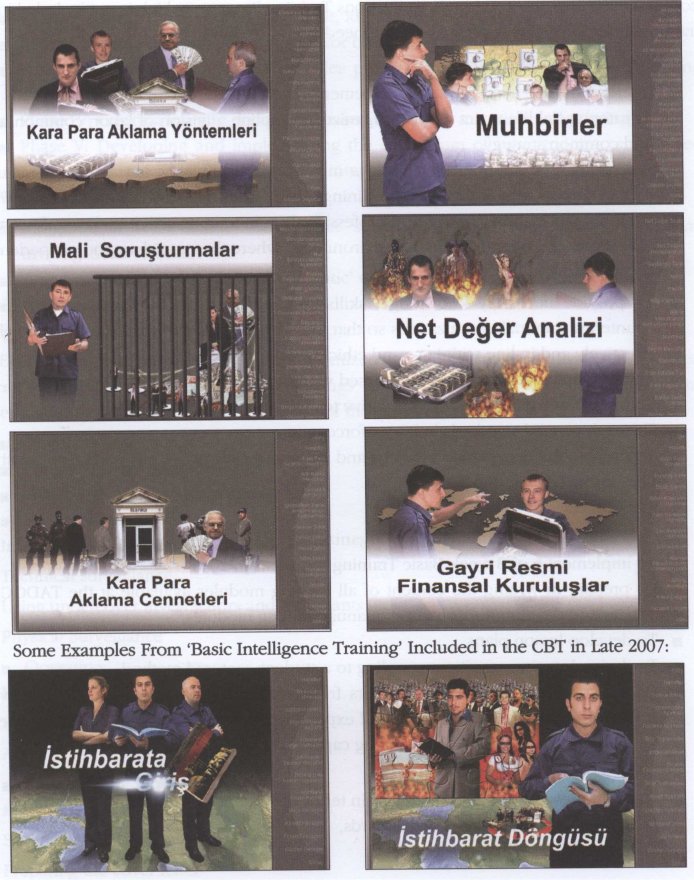
3. TRAINING NEEDS ANALYSIS, DEVELOPING AND EVALUATING PROGRAMS
2007 Activities
In 2007, tactical and specific training programs delivered both locally and internationally were reviewed resulting in the need for preparing training manuals. Training needs analyses revealed that content of local and international training should be put in writing to develop the training programs and catch up with standards in trainings.
Organized Crime Investigations Training Module Project has been started to prepare the content of the Organized Crime Investigations Training Program, which is not included in the training modules kit although it exists as a need.
Project Background
• There exists the need for law enforcement units combating criminal organizations that threaten social life to act with an organized discipline, division of labor, common mind and common strategy.
• For combating criminal organizations in a standardized way, law enforcement units should be provided with standard trainings sharing experiences and know-how.
• In addition to standardization and professionalism in training activities, law enforcement officers should be provided with environments where they can share their experiences. Project Objectives
• To provide necessary knowledge, skills and behaviors to law-enforcement officers countering criminal organizations so that they can run crime investigations proactively, effectively and in line with laws and ethical rules.
• To bring in the concept of project-based working.
• To make available modern investigative techniques.
• To reach general standards in law enforcement.
• To prepare the necessary conditions and medium where active law enforcers can share their knowledge and experiences.
Project Targets
• To formulate a curriculum for the Organized Crime Investigations Training.
• To implement 6 or 8 week Basic Training Programs in 2008
• To prepare in writing the content of all training modules available at the TADOC, to update and develop the content of manual training modules,
• To develop lesson plans,
• To design learning activities according to a student-centered method,
• To select and train additional trainers from among law-enforcement officers having sufficient professional knowledge and experience with the support of existing trainers,
• To enhance field (subject) and training capacities of existing trainers.
Project Benefits
• To ensure institutional sustainability (in terms of content and trainers),
• To lay down law-enforcement standards,
• To make available best practices,
• To prevent negative events such as casualties, death, forensic and administrative investigations, etc. resulting from lack of knowledge and experience,
• To train new trainers in addition to the existing ones and to make sure that trainers meet the same standard in trainings,
• To define problem areas (legislation, procedures, judicial courts and other authorities, etc.) and find permanent solutions to these problems,
• To share such solutions with authorities and reflect them to practice,
• To pave the way for developing skills and attitudes in addition to knowledge building.
Project Phases:
• Phase I: Setting up the project secretariat, identifying project modules,
• Phase II: Defining main and sub topics for contents of the training modules,
• Phase III: Gathering content of modules put on paper by those assigned to writing training modules,
• Phase IV: Creating training documents based on written materials and printing them,
• Phase V: Developing and implementing the curriculum of basic training, specialized training, managers' training, trainers' training and international training programs.
Within the Scope of Phase I:
• Assignments were made for project secretariat under the 'Organized Crime Investigations Project',
• 'Organized Crime Investigation Systematic' was created by secretariat officials,
• 20 training modules were defined.
Furthermore;
Every detail was considered by the 'Organized Crime Investigations Systematic' Project Secretariat discussing and finalizing findings at the workshop. The organized crime investigation was discussed in consideration of the following stages:
• Discovery of the crime suspicion
• Preliminary investigation
• Taking the decision of investigation
• Broadening investigation
Interception of communication
Technical surveillance
Using undercover investigators and informants
Physical Surveillance
• Operation
Before
During
After
• Preparing the inquiry file
Position of the lockup
Statement taking
Preparing the cover letter
• Following the trial phase
• Investigation method
The 'Organized Crime Investigation Systematic' was formulated under the light of the above given stages and secretariat has started and partially completed content making. 'Organized Crime Investigations Training' has been started based on the curriculum formulated with the information at hand.
Within the scope of the project, lesson plans, curricula and training content of the following modules will be formulated:
Training Modules:
1. Information Gathering Training Module
2. Undercover Investigators Training Module
3. Informants Training Module
4. Statement Taking Training Module
5. Surveillance (Physical) Training Module
6. Technical Surveillance Training Module
7. Interception of Communication Training Module
8. Intervention and Use of Force Training Module
9. Search Training Module
10. Criminal Intelligence Analysis Training Module
11. Preparing the Cover Letter and Inquiry File Training Module
12. Suspect and Organization Profiling Training Module (PROJECT)
13. Investigation Management Training Module
14. Operational Planning and Management Training Module
15. Crime Scenes and Crime Scene Management Training Module
16. Preliminary Investigation Training Module
17. Crime Scene Investigation Training Module
18. Investigating Proceeds of Crime Training Module
19. Train the Trainers Training Module
20. Getting Familiar With the Legislation Training Module
Within the Framework of Phase II Workshops:
• Main and sub topics of the training module contents were defined. For this purpose, 10 workshops were organized each lasting for 5 days.
• Assignments were made to write down module contents.
• Training materials needed for trainings were identified.
• New trainers were named and work has been started to train them.
Within the Framework of Phase III Workshops;
(still underway)
^ Notes of participants assigned to this work were brought together for formulating content of training modules.
^ Content so created was discussed and new assignments were made to overcome gaps and missing points.
^ Work has been started to arrange content sufficiently created by participants and agreed upon during discussions.
^ 9 workshops were conducted within the framework of Phase III.
Furthermore,
^ A workshop was conducted to PREPARE LESSON PLANS AND CURRICULA of 30 and 60 hour basic and specialized training activities, the content of which have been mostly
formulated or training of which is already delivered by TADOC.
^ Content of the BASIC TRAINING COURSE delivered to the personnel involved in Anti-
Smuggling in Organized Crime activity was reviewed and Basic Training was provided in Antalya in line with the new planning and content modification.
4. INTERNATIONAL TRAINING
General Overview of 2007 International Training Activities
Since the day of its launching, 149 training activities have been organized at TADOC with participation of 1917 law enforcement officers from 58 different countries.
446 foreign participants attended 32 international training activities in 2007.
Number of training activities that took place in the last four years are given in the following table with the number of attending participants.

As in previous years, TADOC continued its contributions in law enforcement training as a tool of supporting international fight against drugs and organized crime.
2007 was another year of dedicated efforts for Afghanistan just as 2006. For the aim of enhancing the capacity of Afghani Anti-Narcotics Force, 4 workshops were organized for Afghanistan one with the contribution of DEA, USA serving to 56 law enforcement officers in total.
'Narcotics Law Enforcement Training' was organized on 29 October — 2 November 2007 with participation of law enforcement officers from Afghanistan and Pakistan as a step forward for creating dialogue and cooperation between Afghanistan and Pakistan as a result of the Tripartite Summit that took place in Ankara on 29-30 April 2007.
Last year, contribution was also provided to training initiatives of UNODC, OSCE, Blacksea Economic Cooperation (BSEC) and Economic Cooperation Organization (ECO) conducted at countries of the region for capacity building and combating narcotics.
Our Department and TADOC have so far been determined in providing consistent support for international efforts of countering drugs and organized crime. Next year, the same level of contribution will be provided with even more coherence within the framework of cooperation and initiatives with international organizations such as UNODC, NATO — Russian Council, etc. as well as bilateral security agreements with our counterparts.
Training Activities With the UN
Train the Trainers Workshop for AIDS/HIV
Within the framework of cooperation between UNODC's Balkan Office and TADOC, two rounds of Train the Trainers Workshops were organized on AIDS/HIV with participation of Balkan countries. During the first week, participants were briefed on AIDS/HIV dedicating the second and the third weeks for train the trainers curriculum that would make it possible for the participants to fulfill their role as trainers.
Following are the Notes From These Training Activities:
1. The first workshop took place on 07-23 March 2007 with the participation of 10 future trainers, as one from Montenegro, Romania, Serbia, Macedonia and Albania, and two from Bosnia-Herzegovina and Bulgaria.
2. The second one took place on 17 October 02 November 2007 with the participation of 9 future trainers, as one from Albania, Croatia, Montenegro, Kosovo, Macedonia, Romania and Serbia, and two from Bosnia-Herzegovina .
Leadership and Management Skills Training
Three rounds of Leadership and Management Skills Workshops were organized at TADOC within the framework of cooperation with UNODC and training support of British experts.
Following are the Notes From These Training Activities:
1. The first of these workshops was held in Tajikistan on 15-19 January 2007 with participation of 10 Tajik law enforcement officers.
2. The second one took place in Tajikistan on 22-26 January 2007 with participation of 8 Tajik law enforcement officers.
3. The last one was held again in Tajikistan on 10-14 October 2007 with participation of 9 Tajik law enforcement officers.
Law Enforcement Exchange (Lex-Pro) Project:
Lex-Pro Project was launched under the guidance of United Nations Office on Drugs and Crime (UNODC) among the countries of Western Balkans and Mediterranean and European Union (EU) by exchange of narcotic law enforcement officers with an objective of enhancing capacity in target countries.
Five Thematic Areas Were Identified for Exchange of Law Enforcement Officers Within the Scope of the Project:
1. Sea ports
2. Airports
3. Land borders
4. Investigation techniques
5. Human resources management
Western Balkans Kick-Off Meeting of the project took place on 11 December 2007 with participation of focal points from Albania, Bosnia-Herzegovina, Croatia, Montenegro, Kosovo, Serbia, TADOC, General Command of Gendarme and Under-Secretariat of Customs from Turkey, liaison officers of France and Belgium in Ankara as representatives of member states from EU and UNODC officials. Two officials from Egypt attended the 'kick-off meeting' for Mediterranean countries taking place in Cairo, Eypt in January 2008 with an observer status.
Turkey will contribute to the project with training activities to take place at TADOC throughout 2008 specifically designed as 'Train the Trainers Workshop' under the 'Human Resources Management' thematic area and 'Controlled Delivery Workshop' under the 'Investigation Techniques' thematic area.
^ Training Activities with OSCE
The following training activities were organized in cooperation with OSCE:
1. 'Surveillance Techniques Training' was delivered by TADOC's Mobile Training Team on 07-18 May 2007 to participants from Montenegro.
2. 'Organized Crime Investigations Training' was delivered by TADOC's Mobile Training Team on 05-09 November 2007 to 19 law enforcement officers from Albania. is
Training Activities with BSEC
Turkey took over the BSEC (Blacsea Economic Cooperation) Presidency as from 01 May 2007, within the framework of which 6 law enforcement officers from member states of BSEC attended the 'Narcotics Law Enforcement Training' on 02-06 July 2007 at TADOC.
Law enforcement officers from Azerbaijan, Bulgaria, Georgia, Romania, Serbia and Greece attended the above mentioned training activity.
^ Training Activities with ECO
'Drug Concealment Places and Search Techniques Training' was organized at TADOC on 17-21 September 2007 with participation of 7 law enforcement officers from 4 ECO member states.
2 law enforcement officers from Azerbaijan, 2 from Pakistan, 2 from Iran and 1 from Afghanistan participated in this training activity.
^ Training Activities within Bilateral Cooperation
The below table lists countries having concluded bilateral security agreements with Turkey and number of participants they sent to training activities conducted in 2007.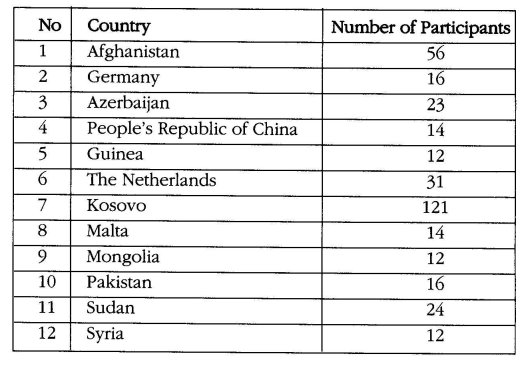
Intemship
The Netherlands
Mutual officer exchange project was started between the Dutch Police Academy and Department of Anti-Smuggling and Organized Crime / TADOC for internship opportunities. Within the framework of this project,
- 'Internship Program for Combating Organized Crime' was delivered at TADOC on 16-20 April 2007 to 15 Dutch investigators,
- and on 22-26 October 2007 to 16 investigators.
Likewise,
- 1 week internship program was provided to 13 Turkish officers from Headquarters and Provincial Units of our Department on 26-30 November 2007 in the Netherlands.
Germany
In 2006, student exchange project was enforced by and between BKA and the Department of Anti-Smuggling and Organized Crime / TADOC. Within the framework of this project, 16 senior students of BKA attended the third of the internship activities on 12-19 November 2007 at TADOC.
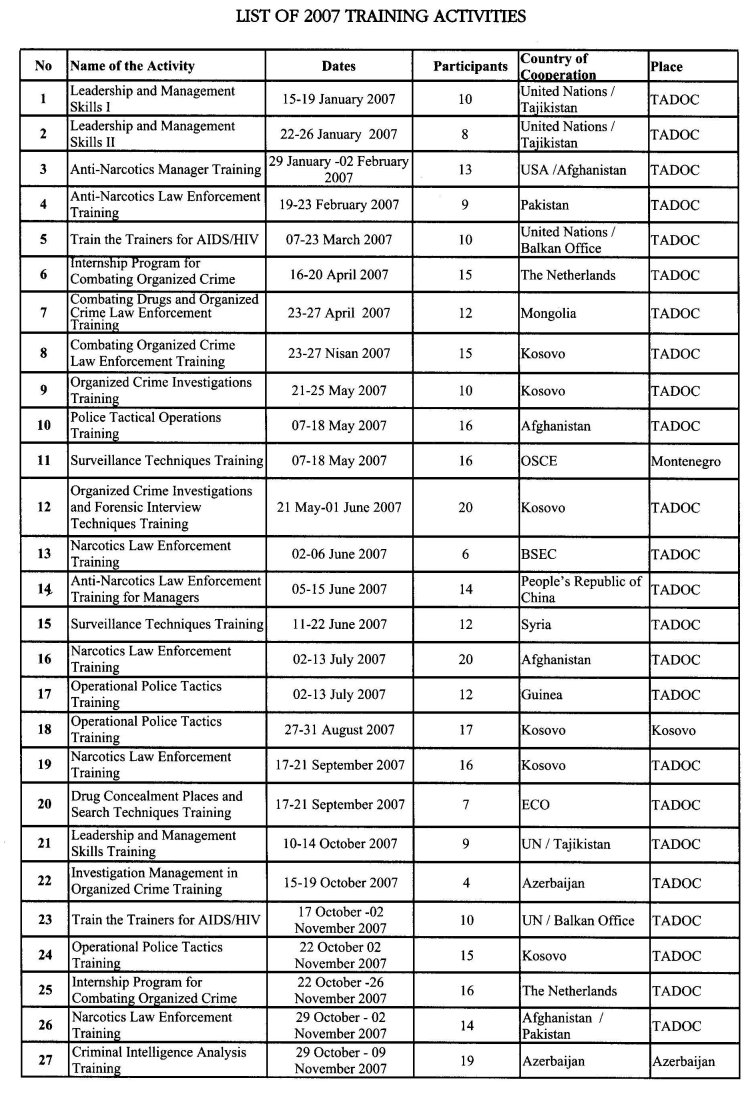

| < Prev | Next > |
|---|












